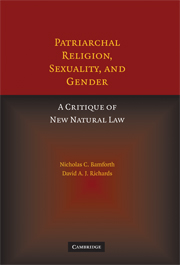Book contents
- Frontmatter
- Contents
- Acknowledgments
- 1 New Natural Law in Context
- 2 Criteria for Evaluating New Natural Law
- 3 The Architecture and Reach of New Natural Law
- 4 Internal Consistency (1): Is New Natural Law Secular?
- 5 Internal Consistency (2): New Natural Law and Thomas Aquinas
- 6 Substantive Appeal (1): What's Wrong with Homophobia and Sexism?
- 7 Substantive Appeal (2): New Natural Law, Sexism, and Homophobia
- 8 Moral Absolutes and the Possible Fundamentalism of New Natural Law
- 9 New Natural Law and Patriarchal Religion
- 10 Concluding Observasions, and Christian Alternatives to New Natural Law
- Bibliography
- Index
9 - New Natural Law and Patriarchal Religion
Published online by Cambridge University Press: 14 August 2009
- Frontmatter
- Contents
- Acknowledgments
- 1 New Natural Law in Context
- 2 Criteria for Evaluating New Natural Law
- 3 The Architecture and Reach of New Natural Law
- 4 Internal Consistency (1): Is New Natural Law Secular?
- 5 Internal Consistency (2): New Natural Law and Thomas Aquinas
- 6 Substantive Appeal (1): What's Wrong with Homophobia and Sexism?
- 7 Substantive Appeal (2): New Natural Law, Sexism, and Homophobia
- 8 Moral Absolutes and the Possible Fundamentalism of New Natural Law
- 9 New Natural Law and Patriarchal Religion
- 10 Concluding Observasions, and Christian Alternatives to New Natural Law
- Bibliography
- Index
Summary
In previous chapters, we demonstrated the logical dependence of the new natural lawyers' arguments concerning sexuality and gender on their authors' Catholic faith, and explained why those arguments concerning sexuality and gender are morally unappealing. We also noted in Chapter 3 how – within the Catholic Church – the new natural lawyers tie their views to a defense of Papal authority and an attack on theological dissent. In many areas, the Church has come a very long way in shifting its position to accommodate the fundamental tenets of constitutional democracies. It has, for example, wholly altered its views relating to slavery and, in the Second Vatican Council, to religious intolerance. However, it has so far refused to adopt a more tolerant stance toward sexual morality or sexual minority groups, or to adopt a less inflexible conception of gender. We argue in this chapter that such refusals would appear to be due to the powerful reactionary political psychology of the celibate male clergy of the Catholic Church, a psychology that is rooted in unjust patriarchal arrangements (in that the clergy is granted ultimate moral and religious authority over questions of sexual morality, this authority entailing the silencing of any voice that might reasonably challenge it) and is very much threatened by the emergence – in modern society – of liberal perspectives concerning sexuality and gender.
- Type
- Chapter
- Information
- Patriarchal Religion, Sexuality, and GenderA Critique of New Natural Law, pp. 304 - 333Publisher: Cambridge University PressPrint publication year: 2007
- 1
- Cited by



